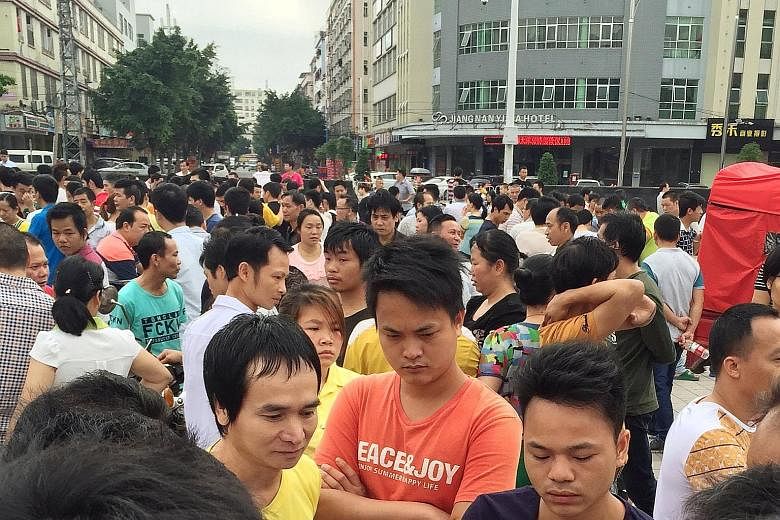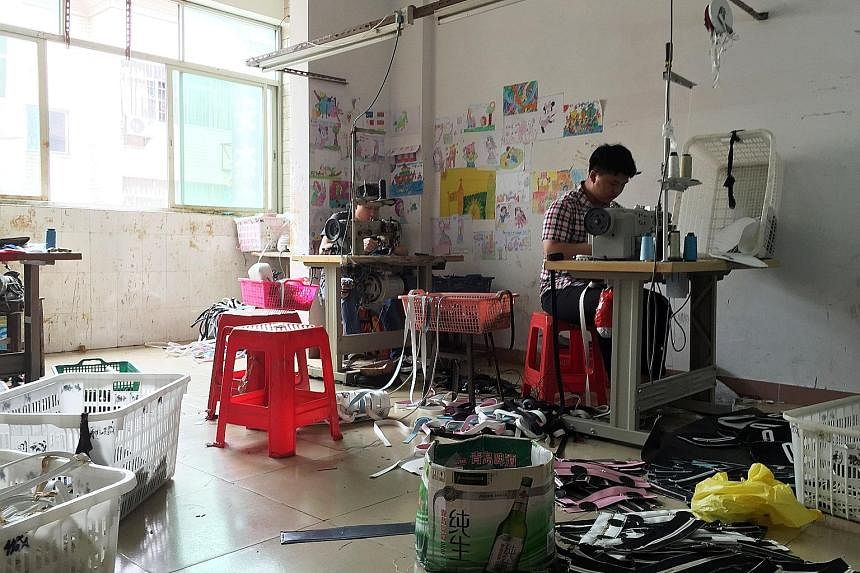SHILING • Squeezed by high costs and unpredictable demand, some factories in southern China's manufacturing heartland are turning to a new strategy to survive: hiring workers by the day.
It is a far cry from Beijing's vision of a slick, high-tech manufacturing future of computers and chip makers. On a warm morning in the southern town of Shiling, dozens of workers gather on a city street to haggle for a day of work making bags for 130 to 200 yuan (S$27 to S$42).
Factory owners in this leatherworking town, and in those nearby, say just-in-time labour allows them to stay competitive, even if day wages can be higher, individually, than full-time salaries.
Workers, operating in a legal grey area, say they tolerate the conditions because many fear factories offering permanent jobs could fail to pay if clients dry up and the manager runs off.
"We never used to hire temporary workers, because labour costs were not very high. Our workers were on staff," said Mr Huang Biliang, who runs a button factory in the southern city of Dongguan. "But recently we've started to hire more temporary labour."
In a stainless steel factory in the nearby town of Jiangmen, Mr David Liang, manager of Chiefy, agrees: "Every additional (permanent) worker I hire is an additional risk."
The result is a section of China's manufacturing base that has adapted to volatile conditions and higher wages - keeping the country's hold on some labour-intensive work that it might have lost to cheaper regions elsewhere in Asia.
Struggling companies do occasionally turn to temporary workers - but this is a change for China, where authorities have sought to crack down on precarious employment, introducing tougher rules in 2012 to protect so-called "dispatch'"workers.
China wants to shift away from piece-work towards a high-tech consumer economy.
Shiling's experience suggests, however, that casual labour could help the country's plethora of small manufacturers remain sellers of cheap shoes, toys and stainless steel pans for a few years yet.
Casual work has been thriving in pockets of the industrial landscape, especially where clusters have created a base of experienced workers: in toys, garments and, Reuters found, in the bag and stainless steel industries in southern Guangdong province.
"It's an indication that China will probably succeed and maintain its manufacturing base," said Mr Ben Simpendorfer, managing director of consultancy Silk Road Associates.
While the use of undocumented day labourers by factories is hard to capture in statistics, academics, consultants and factory managers say it has risen since the financial crisis and accelerated in the past two years.
In surveys by Laborlink, a San Francisco-based polling group, the percentage of Chinese workers who said they had been in their jobs less than one year rose from 33 per cent in 2014 to 40 per cent in 2016.
Needing to maintain employment, local authorities appear to tolerate the arrangement.
In Shiling - China's bag capital - men and women gather in the early morning looking for a day's work. Factory managers in vans and on scooters each hold a sample of the bag they produce; workers crowd around them, examining the sample and discussing the per-piece wage.
Among the workers is 39-year-old Wang Binge, who until three years ago ran her own small handbag workshop nearby. But orders dried up.
"Bags are a terrible industry," said fellow day labourer Wang Guinan. "We know we should do something else, but we don't know where to start."
REUTERS


